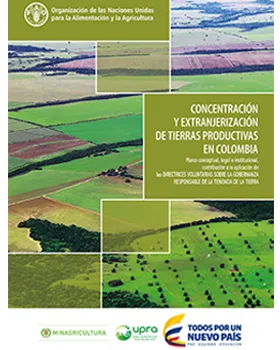It proposes a context and general theoretical framework, along with a specific conceptual outline for the Colombian case. It defines the categories of concentration, accumulation, land grabbing, and foreign ownership of productive rural lands. Drawing on the contents of existing literature and data, the study addresses dynamics and processes related to land ownership and tenure, investments, equitable access and use, as well as the legal and policy evolution. It examines current positive and negative incentives, advantages, and limitations.
The study includes a diagnosis of the Colombian case, a methodological proposal for identifying, observing, and estimating risks associated with large-scale investments in productive rural lands in Colombia. Additionally, it highlights certain observations and findings, and offers recommendations for public policy. Keywords: concentration, foreign ownership, land grabbing, accumulation, productive rural lands, land tenure, large-scale investments, food security, rights-based approach, risk assessment.


